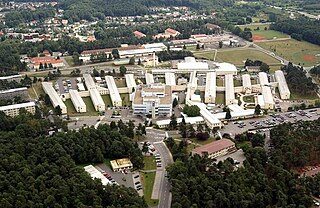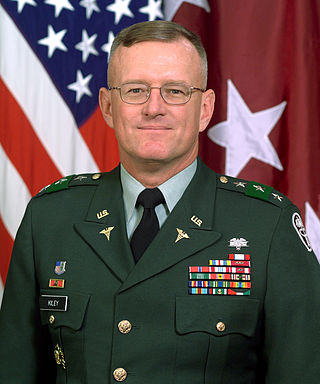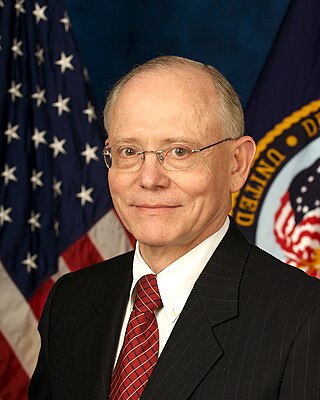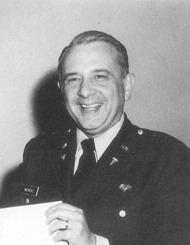
The U.S. Army Medical Command (MEDCOM) is a direct reporting unit of the U.S. Army that formerly provided command and control of the Army's fixed-facility medical, dental, and veterinary treatment facilities, providing preventive care, medical research and development and training institutions. On 1 October 2019, operational and administrative control of all military medical facilities transitioned to the Defense Health Agency.

The Walter Reed Army Medical Center (WRAMC), officially known as Walter Reed General Hospital (WRGH) until 1951, was the U.S. Army's flagship medical center from 1909 to 2011. Located on 113 acres (46 ha) in Washington, D.C., it served more than 150,000 active and retired personnel from all branches of the United States Armed Forces. The center was named after Walter Reed, a U.S. Army physician and sergeant who led the team that confirmed that yellow fever is transmitted by mosquitoes rather than direct physical contact.

Uniformed Services University of the Health Sciences (USU) is a health science university and professional school of the U.S. federal government. The primary mission of the school is to prepare graduates for service to the U.S. at home and abroad as uniformed health professionals, scientists and leaders; by conducting cutting-edge, military-relevant research; by leading the Military Health System in key functional and intellectual areas; and by providing operational support to units around the world.

The Army Medical Department of the U.S. Army (AMEDD), formerly known as the Army Medical Service (AMS), encompasses the Army's six medical Special Branches. It was established as the "Army Hospital" in July 1775 to coordinate the medical care required by the Continental Army during the Revolutionary War. The AMEDD is led by the Surgeon General of the U.S. Army, a lieutenant general.

The Landstuhl Regional Medical Center (LRMC), also known as Landstuhl Hospital, is a U.S. Army post in Landstuhl, Germany, near Ramstein Air Base. It is an amalgamation of Marceau Kaserne and Wilson Barracks (Kirchberg-Kaserne), which were merged on October 15, 1951. As a Level II trauma center, it has 65 beds, and is the largest American hospital outside the United States.

The Carl R. Darnall Army Medical Center is a United States Department of Defense medical facility at Fort Cavazos, Texas. It provides medical care to servicemembers and their families, along with veterans and their dependents, in and around the largest U.S. military installation in the world. Named after inventor of water chlorination Brigadier General Carl Rogers Darnall, MD., the core of the medical center is a state of the art 947,000-square-foot hospital. The facility opened in 2016, and includes a full primary care and emergency medical facility, including a level III trauma center, and specialized care in obstetrics and gynaecology, orthopedics, and behavioral health. The hospital provides treatment to nearly 3,000 patients daily. The medical center is one of the largest in the Military Health System, comprising more than 105 buildings in addition to the main facility, spread over Fort Cavazos, three local communities, and a clinic at the Red River Army Depot in Bowie County, Texas, outside of Texarkana. The medical center and its outlying facilities are staffed nearly entirely by uniformed servicemembers of the U.S. Army, however in 2019, the administrative control of the facility was shifted from United States Army Medical Command to the Defense Health Agency, an integrated joint Department of Defense combat support agency. All patients of the facility are insured and billed through Tricare, the health insurance system of the DoD. The medical center is led by Colonel Richard G. Malish.

Eric B. Schoomaker is a former United States Army lieutenant general who served as the 42nd Surgeon General of the United States Army and Commanding General, United States Army Medical Command, and a practicing hematologist. He previously served as Commanding General, North Atlantic Regional Medical Command and Walter Reed Army Medical Center. He assumed the post of U.S. Army Surgeon General on December 11, 2007.

Kevin Christopher Kiley is a former lieutenant general in the United States Army who served as the 41st Surgeon General of the United States Army and the commander of the U.S. Army Medical Command, Fort Sam Houston, Texas. He was commander of Walter Reed Army Medical Center and North Atlantic Regional Medical Command twice, from 2002 to 2004, and as acting commander, March 1–2, 2007. He submitted his request to retire from the U.S. Army on March 11, 2007, in the wake of the Walter Reed Army Medical Center neglect scandal, and was removed from his nominative billet as a lieutenant general. Pending retirement, he was assigned to a temporary billet at the General Officer Management Office at the Pentagon in the grade major general. His retirement in the grade of major general was subsequently approved.

Gale S. Pollock is a retired United States Army major general who served as the Deputy Surgeon General of the United States Army from October 2006 to March 2007, and also as chief of the Army Nurse Corps. She became acting Surgeon General of the United States Army for nine months following the 20 March 2007 retirement of her predecessor, Kevin C. Kiley, due to fallout from the Walter Reed Army Medical Center neglect scandal. She was the first woman and the first non-physician to hold the position.

Lieutenant General George Peach Taylor Jr. USAF (Ret.) was the 18th Surgeon General of the United States Air Force, Headquarters U.S. Air Force, Washington, D.C. General Taylor served as the senior Air Force officer responsible for comprehensive management of the Air Force Medical Service. In this capacity, he advises the Secretary of the Air Force and Air Force Chief of Staff, as well as the Assistant Secretary of Defense for Health Affairs, on matters pertaining to the medical aspects of the air expeditionary force and the health care of 2.6 million Air Force beneficiaries. The Surgeon General has authority to commit resources for the Air Force Medical Service, to make decisions affecting the delivery of medical services, and to develop plans, programs and procedures to support worldwide medical service missions. The Surgeon General exercises direction, guidance and technical management of more than 42,000 people assigned to 74 medical treatment facilities worldwide. From September 7, 2010 – December 22, 2010 he served as the acting Assistant Secretary of Defense for Health Affairs

The Alexander T. Augusta Military Medical Center is a United States Department of Defense medical facility located on Fort Belvoir, Virginia, outside of Washington D.C. In conjunction with Walter Reed National Military Medical Center, the hospital provides the Military Health System medical capabilities of the National Capital Region Medical Directorate, a joint unit providing comprehensive care to members of the United States Armed Forces located in the capital area, and their families.

The term military medicine has a number of potential connotations. It may mean:

James Benjamin Peake was the sixth United States Secretary of Veterans Affairs, serving from 2007 to 2009. In 2004, he retired from a 38-year United States Army career. He also served as the 40th Surgeon General of the United States Army.

Hal Bruce Jennings, Jr. was an American plastic surgeon who served as Surgeon General of the United States Army from October 10, 1969, to September 30, 1973.

Major General Enrique Méndez Jr. Grau was a United States Army officer who was also the first Puerto Rican to hold the positions of Army Deputy Surgeon General, Commander of the Walter Reed Army Medical Center and Assistant Secretary of Defense for Health Affairs. He was also the Dean and President of the Ponce School of Medicine in Puerto Rico. Also served as Secretary of Health of Puerto Rico.

Joseph Caravalho Jr. is an American physician and retired Major General of the Medical Corps of the United States Army. He is currently the president and CEO of the Henry M. Jackson Foundation for the Advancement of Military Medicine. He has held specialized staff medical positions, served in operations at hospitals, and commanded major medical installations across the United States as well as operations in actions overseas. In December 2015, he was appointed as the Joint Staff surgeon, the chief medical advisor to the Chairman of the Joint Chiefs of Staff.

Douglas J. Robb is a retired United States Air Force lieutenant general who last served as the Director of the Defense Health Agency. Before that, he held several high-level health positions in the United States Department of Defense and Air Force, including terms as Deputy Director, Tricare Management Activity, the Joint Staff Surgeon, Command Surgeon of the Air Mobility Command (AMC) and Command Surgeon of the United States Central Command (USCENTCOM).

Shan K. Bagby is a United States Army brigadier general and the 28th Chief of the Army Dental Corps. Bagby also serves as the Commanding General, Regional Health Command-Central. Bagby, an oral and maxillofacial surgeon, was the Army’s first African-American dental officer promoted to brigadier general.

Paula C. Lodi is a United States Army major general who has served as commanding general of the United States Army Medical Research and Development Command since July 10, 2024. She served as commanding general of the 18th Medical Command from June 2022 to July 2024. She previously served as Deputy Commanding General for Support of the United States Army Medical Command from July 2021 to May 2022. Lodi was the first female commander of the 44th Medical Brigade. She is also the younger sister of Lieutenant General Maria Barrett. Lodi and Barrett are the United States Army's first ever sister General Officer tandem.

Michael L. Cowan was an American navy admiral who was a Surgeon General of the United States Navy.




















